
9 minute read
I Sing for Him
The chapel at Saint Francis Hospital is not subtle. It’s cavernous and bright. But even as one stands in the middle of the beautiful expanse, there’s an overwhelming sense of warmth and intimacy. In many ways, it’s a reflection of God’s infinite love for us all. Deliberate in its grand design.
This is where Cindy Guzman found her voice again.
On most days, you can find Cindy pushing her housekeeping cart through the lobby and hallways of the hospital, cleaning and sanitizing with intention. It’s a role as important as any, maybe even more so these days.
When Cindy was a young woman, she called to God, asking for the gift to sing. She wanted nothing more than to praise him through song, singing only to Him, for Him.
“It was an amazing moment,” said Guzman. “When I asked for the gift, I felt this hand on my throat and I knew that He had answered my prayer.” From that day on, she sang. For Him. It was how she prayed and connected with God. It brought a measure of calm and purpose to her life as she navigated the daily obligations we all endure. Raising a family. Working to make ends meet. Being a loving wife.
Then tragedy struck. In an unfortunate turn of events, her husband unexpectedly passed away. That moment not only took her husband, it took her voice, too. While her love for God remained, the singing stopped.
“I just couldn’t do it anymore,” Guzman said.
She fell silent—for six years.
Then one day the phone rang. It was a friend who had a job opportunity in Environmental Services at Saint Francis Health System. To say it was a last-minute call would be an understatement. Interviews were taking place in 15 minutes. She immediately turned her car around.
“I felt like if it was meant to be, God would get me to that interview,” Guzman recalled. “Of course, it was raining and my daughter and I got stranded in a flood. But like Moses, I asked for Him to clear the water. Needless to say, I made it to the interview.”
That was four years ago.
Today, the chapel’s normal, quiet solitude is filled with song. Amazing Grace. It’s Cindy’s pre-and post-shift ritual. Standing in front of the altar in full reverence, her delivery is big and bold, coming from the deepest reaches of her heart. Every inch of the chapel reverberating with love. It has the power to move all that hear to tears.
“I came in one day to pray and wondered with the echo, what would my voice sound like,” said Guzman. “So, I started singing again. At first, I was a little nervous because it had been years since I sang but over time, my voice came back. And now, I sing before and after every shift, right here in the chapel.” While she continues to sing just for God, it has proven to have a tremendous impact on the hospital staff and even the patients.
“I started off just singing before my shift, but once we were in the pandemic, one of our executives, Eric Schick, heard me sing and then asked me to sing at the end of my shift, too,” Guzman continued. “He said, we need to do everything we can to usher in the Spirit, including my singing.”
Without doubt, it does just that. Standing in the presence of her singing, you stand in the presence of the Holy Spirit. And it moves, without obstruction, through the entirety of the hospital, touching everyone’s soul whether they know it or not.
“Everybody deserves to have His love,” Guzman concluded.
So, she sings. For Him.
Amazing Grace
Amazing grace How sweet the sound That saved a wretch like me I once was lost But now I'm found Was blind, but now I see
'Twas grace that taught My heart to fear And grace my Fears relieved How precious did That grace appear The hour I first believed
Through many dangers Toils and snares We have already come 'Twas grace hath brought Us safe thus far And grace will lead us home
When we've been there Ten thousand years Bright shining as the sun We'll have no less days to sing God's praise Than when we first begun
Amazing grace How sweet the sound That saved a wretch like me I once was lost But now I'm found Was blind, but now I see

Saint Francis Xavier: Honoring Our Namesake

It’s an honest mistake. A common assumption among most people, even clergy. While Saint Francis of Assisi is certainly a notable saint for all of his own good deeds, the fact is, the hospital and health system were named after Saint Francis Xavier, the “Apostle of the Indies” and the patron saint of foreign missionaries.
Born Francisco de Jaso y Azpilicueta in Xavier Castle near Pamplona, Spain, on April 6, 1506, he was a Basque of Navarre, a region along the southern slope of the Pyrenees. His education, more to the point, his mission, began at the University of Paris under the tutelage of Ignatius Loyola. Saint Ignatius of Loyola himself, was a Spanish priest and theologian who founded the Jesuit order in 1534, which, by many accounts, helped lead the charge in modernizing the Catholic Church.
Xavier was among the seven original Jesuits who, on August 15, 1534 at Montmartre, took vows of poverty and chastity. According to historical account, he was to “…enter upon hospital and missionary work in Jerusalem, or to go without questioning wherever the Pope might direct.” (Rose, Stewart, St. Ignatius Loyola and the Early Jesuits, Catholic Publication Society, Co., 1891).
He eventually was ordained in Venice in 1537 and began his missionary work under the flag of King John III of Portugal in Goa, a Portuguese colony on the western coast of India. During his time there, he cared for the ill in the Royal hospital and preached in the streets for the conversion and salvation of non-Christian souls.
It was in 1545, that he began his adventures on the sea, sailing to Cochin, the Malabar coast, Tamil Nadu, and as far as Malacca and Japan. These journeys would be the backdrop to the many miracles he performed, including turning casks of sea water into fresh water for sailors and bringing a boy back to life after falling overboard.
When it comes to understanding why Saint Francis Xavier was selected to be the namesake of the health system, some will point to the obvious connection that William K. Warren, Sr. was born on Saint Francis Xavier’s feast day, December 3. That, and the fact that Saint Francis Xavier had an affinity and devotion for hospital work. However, Bishop David Konderla of the Diocese of Tulsa and eastern Oklahoma has his own thoughts on why Saint Francis Xavier was chosen.
“The stained-glass windows in the chapel depict Saint Francis Xavier as a calming presence in the midst of stormy seas,” Bishop Konderla said. “Life is like that, particularly, if we’re faced with a frightening health outcome. But if we know who holds our life, then even when it becomes a stormy sea, we can be calm because we know it’s God’s will.”
Saint Francis Xavier passed on December 3, 1552 while on Shangchuan Island. He died praying between bouts of fever induced delirium at age 46. He was later canonized in 1622 by Gregory XV. Saint Francis Xavier remains an enduring figure in the Catholic tradition and the spiritual inspiration of our health system’s ongoing legacy of calmly caring for one’s body and soul.



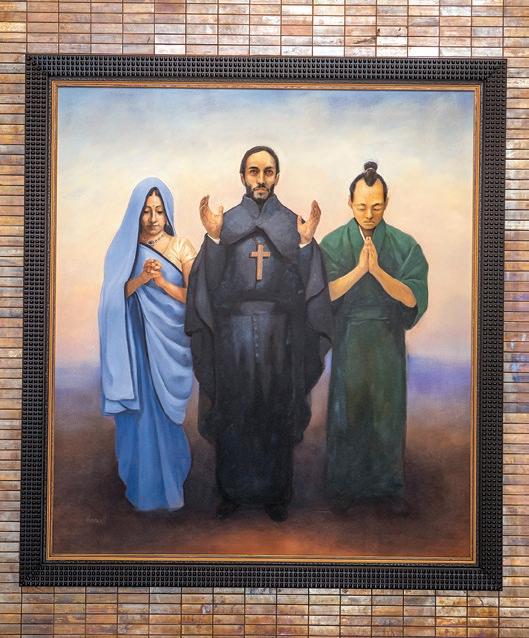


Making Saint Francis Stronger with Their Presence

Celebrating Saint Francis Health System Nurses


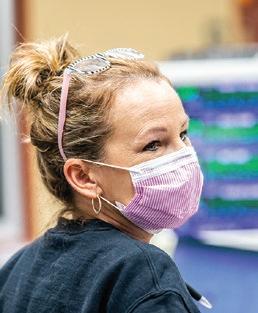
Since our founding and throughout our growth and expansion, Saint Francis Health System nurses have been foundational to the success of the health system. We often say our nurses are the crucial link between doctors and patients, but they are so much more than that. They are the compassionate caregivers that respond at all hours of the night and day. They comfort. They listen. They pray. They make our health system stronger with their presence. We celebrate their contributions over the past 60 years, their strength in the present and what they'll bring to our future.








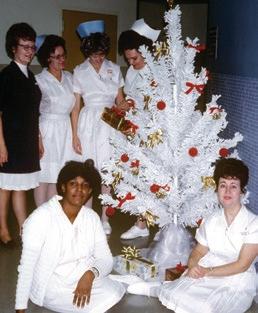





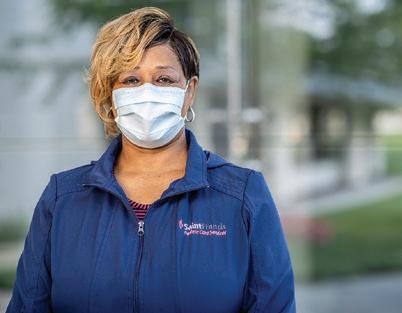


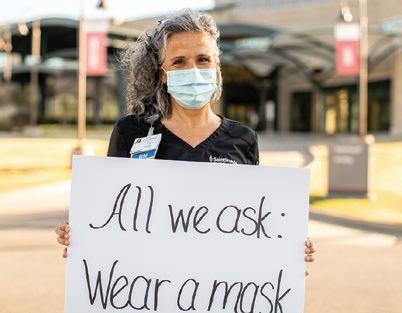









6161 South Yale Avenue • Tulsa, Oklahoma 74136
a publication of Saint Francis Health System
MISSION
To extend the presence and healing ministry of Christ in all we do
VISION
Inspired to create a sustainable and just healthcare system, Saint Francis will be the technology-enabled health ministry that delivers integrated, market-leading, highquality, affordable care through engaged caregivers to the people of eastern Oklahoma.
VALUES EXCELLENCE
Promoting high standards of service and performance
DIGNITY
Respecting each person as an inherently valuable member of the human community and as a unique expression of life
JUSTICE
Advocating for systems and structures that are attuned to the needs of the vulnerable and disadvantaged and that promote a sense of community among all persons
INTEGRITY
Encouraging honesty, consistency and predictability in all relationships
STEWARDSHIP
Ensuring prudent use of talents and resources in a collaborative manner





